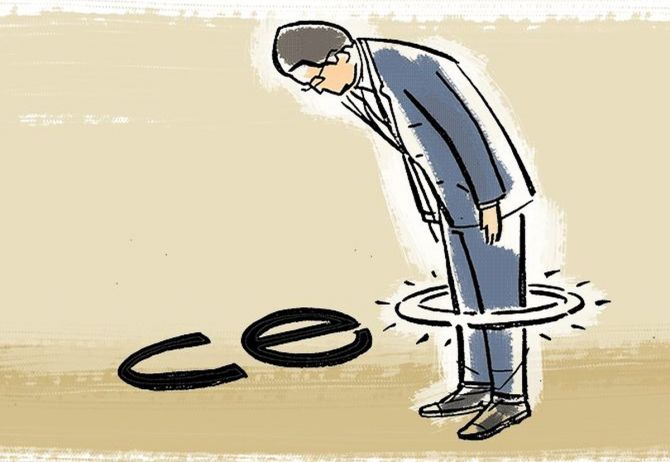'The CEO will neither be able to guide the senior team in operational matters nor decide on their appointment, compensation or removal.'
'Yet, the CEO is responsible for the profit and loss of the bank!'
'Why would the senior executives listen to him?'
'Which self-respecting professional would want to be a CEO with these constraints?' asks Tamal Bandyopadhyay.

Recently, Federal Bank Ltd got the Reserve Bank of India's approval of its managing director and CEO Shyam Srinivasan's reappointment till September 2021.
The current term of Srinivasan, who took over the mantle in 2010, would have ended in September.
In theory, the RBI can allow Srinivasan, 57, to continue till 2025 and return to the helm again after three years. It plans to cap the tenure of a professional banker as CEO at 15 consecutive years.
The individual could be re-appointed after a gap of three years, provided there's no association with the bank in any way during this period. The retirement age remains 70.
Given a chance, would Srinivasan love to have a longer innings? I bet not.
A discussion paper on governance in banks, put up on the Indian central bank's website in June, has proposed to make the CEO of a bank a titular head!
Srinvasan had run the consumer banking division at Standard Chartered Bank in India before moving to Federal Bank.
The business heads in foreign banks typically have a dual reporting relationship -- to the global business heads in different geographies as well as the local CEO.
If this dilutes the role of a foreign bank CEO, once the new governance regime takes off, the CEOs of Indian private banks would be worse off, playing the role of a glorified company secretary, preparing and circulating the agenda of the board meetings as well as the minutes of the previous meetings 'in a timely manner'.
The governance in private banks needs to be strengthened. Their share of business has been rising.
In financial year 2019, they had 76 per cent share of the incremental advances and 77 per cent of the deposits.
Besides, in the recent past, we have seen extremely poor governance in a few large listed private banks where boards were the handmaidens of the CEOs who lacked integrity.
The principles of the proposed guidelines are in sync with the best practices in the developed markets as outlined in the guidelines of the Basel Committee on Banking Supervision on corporate governance principles for banks.
'The board of a bank has overall responsibility for the bank, including culture, governance framework and approving as well as overseeing management's implementation of the bank's strategic objectives. Directors have responsibilities to the bank's overall interests.'
Starting with this preamble, the paper goes beyond culture and governance and roots for micro management by the independent directors. Therein lies the problem.
It strips the CEO and even the non-executive chairman of all powers and wants board-run banks even as the capital markets regulator feels 'the day-to-day management of the company is the responsibility of the management'.
Also, Section 10 B (ii) of the Banking Regulation Act says, 'the management of the whole of the affairs of... a banking company shall be entrusted to a managing director who shall exercise his powers subject to the superintendence, control and direction of the board of directors.'
Going by the paper, a bank must have three lines of defence for risk management -- the business line (including a robust finance and accounting function); a risk-management function and a compliance function independent from the first line of defence; and an internal audit and vigilance function, independent from the first and second lines of defence.
No one can challenge the proposition, but the devil is in the detail. How will it be executed?
The chief risk officer, the head of internal audit, the chief compliance officer and the internal vigilance head will report directly to the respective board committees.
The company secretary will report to the chairman and the head of human resources will report to the nomination and remuneration committee.
Such committees will be responsible for the selection of the executives, approval of their budgets, performance appraisals and compensation.
The CEO will neither be able to guide the senior team in operational matters nor decide on their appointment, compensation or removal.
Yet, the CEO is responsible for the profit and loss of the bank! Why would the senior executives listen to him?
Which self-respecting professional would want to be a CEO with these constraints?
The non-executive chairmen of banks would be lame ducks just as the CEOs. They cannot chair any committee and can't even be a member of the audit and the risk committees.
The chairman and members of audit, risk and nomination committees also cannot be on any risk-assuming business committees such as those for credit and investments.
To put this in practice, each bank will require at least 10 independent directors. So, 20-odd private banks will need around 200 independent directors with immaculate knowledge of different facets of banking, flawless execution and extraordinary commitment.
Otherwise, the task cannot be accomplished through six meetings round the year. Even if they see this as an act of charity (as the compensation is too modest), where will such directors come from? Mars?
The proposed governance norms seem to be pushing for a role reversal -- make the non-executive directors run the bank and take away the executive powers of the CEO who gets the top job after passing the rigorous 'fit and proper' test of the regulator.
Can the non-executive directors run a bank? They can certainly oversee governance and risk-management practices, but isn't risk-taking the CEO's job?
Depositors always look up to the banks, but investors bank on the bankers. They would love to see a Jamie Dimon and an Aditya Puri running their banks forever.
They can always say if there is no floor for the CEO's tenure, why should there be a cap? Can't the RBI sack a compromised or incompetent CEO even before completing a year?
This is a different debate. The spotlight is also on many CEOs' unwillingness to identify and nurture their successors.
But the discussion paper is missing the woods for the trees and if the new norms are put in place, the private banks will be no different from their peers in the public sector.
Incidentally, these norms will be applicable to the government-owned banks in areas where there is no conflict with the provisions of the statutes that govern them and where their major shareholder, the Government of India, 'retains its instructions'.
So, regulations will never be ownership-neutral, the key to corporate governance.
Tamal Bandyopadhyay is an author and senior adviser to Jana Small Finance Bank Ltd.
Feature Presentation: Rajesh Alva/Rediff.com











 © 2025
© 2025